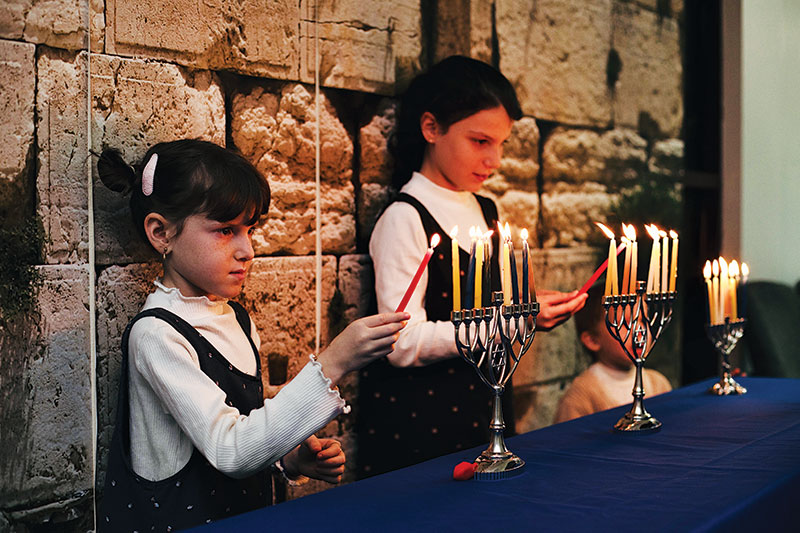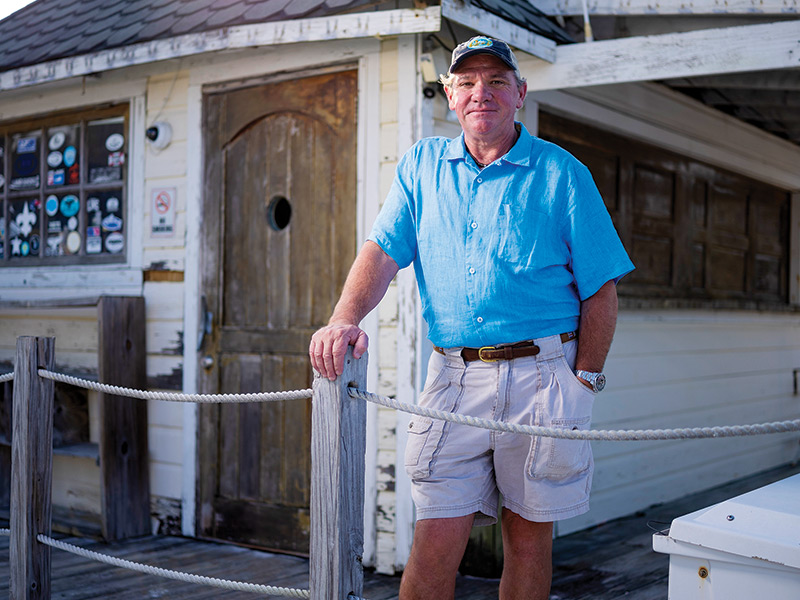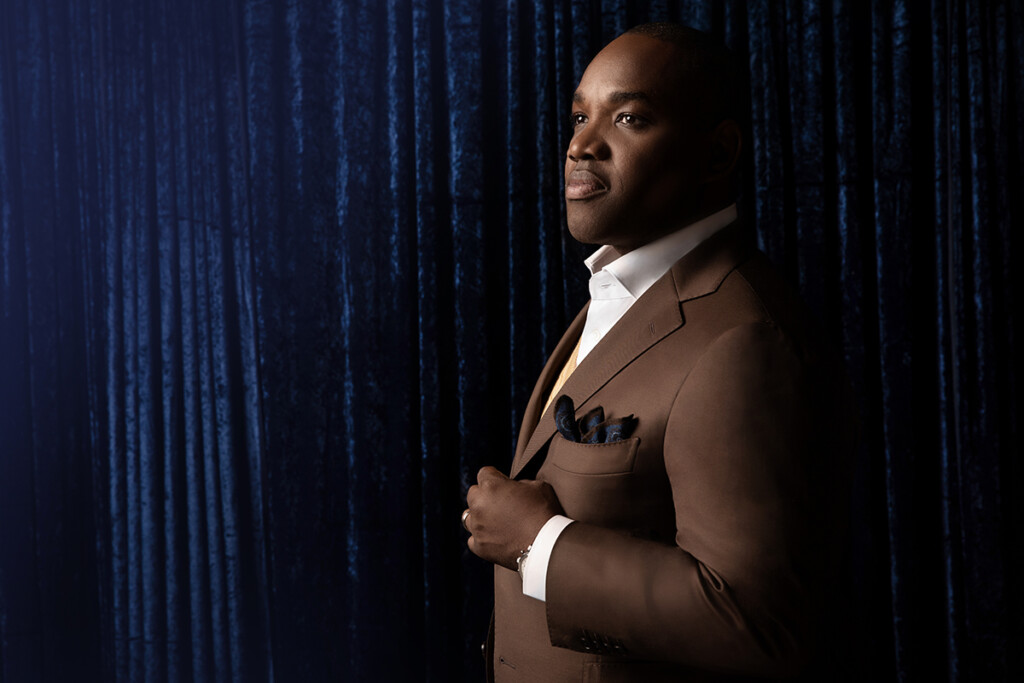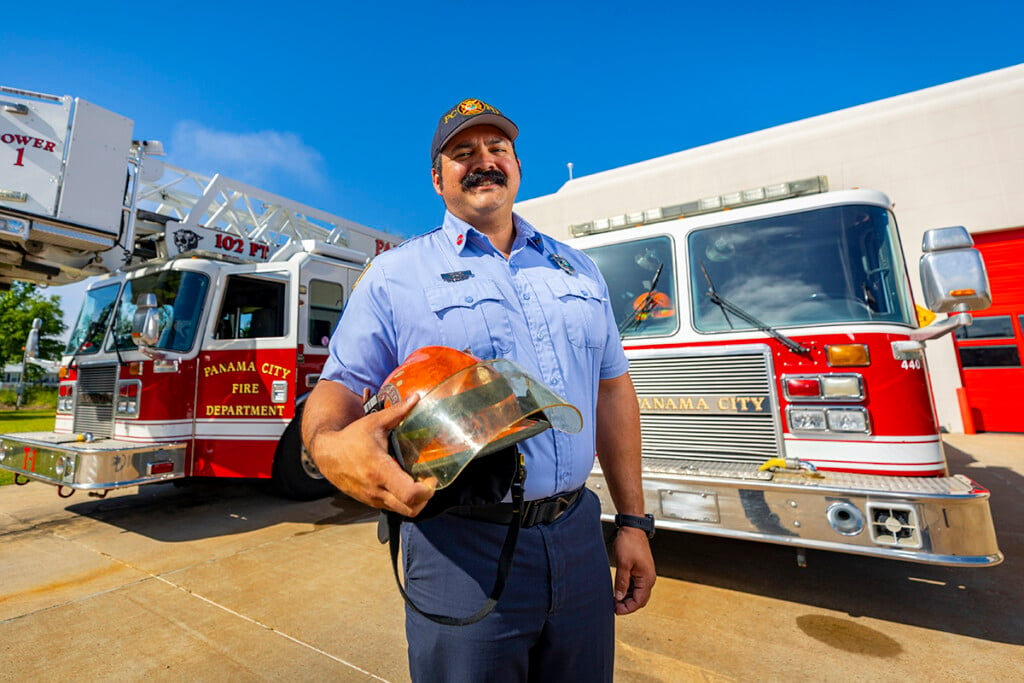Banishing Darkness
Chanukah celebrates the power of a candle

For Rabbi Shaya Tenenboim, Chanukah — the Jewish festival of lights — and the events that brought about the observance have countless layers of meaning that yield an inexhaustible supply of insights.
“It is very hard to summarize Chanukah in a few phrases because there are so many aspects to it, so many teachings,” said Tenenboim of the Chabad of the Emerald Coast in Destin. “Every year, I learn something new that I pass on to others.”
Still, he was willing to capsulize Chanukah by citing three fundamental lessons for the benefit of someone who is not well-versed in Jewish beliefs, traditions or practices.
» “A little light banishes a lot of darkness.” Tenenboim cited that passage from Tanya, a foundational work of the Chabad movement written in 1796, and added, “Light a single candle in a dark room, and you can see it from all over. Do one good deed, and it will have a greater impact than you might think. Light will surround you by an amount that exceeds the effort you put in.”
» One is good, two are better. “During Chanukah, we add a new candle every night,” Tenenboim noted. “One little candle does a lot, but it is not enough. If you can do two candles, do two. And if you did two yesterday, that was good for yesterday, but now increase the number. As much as you do good, try to do more. If you are just sitting back, you are falling behind. The clock is ticking; it is not waiting for us.”
» Still, life is not a numbers game. “You may be in the minority, but if you do the right thing, you shouldn’t be afraid of the many. Stand your ground, stick to your morals, beliefs and values, and God will help you as he did when the Maccabeans took on the Syrian Greeks. It’s not a bad thing to be in the minority. There are many more living things than there are human beings.”
The Jewish people endured a dark period beginning in 332 BCE when Alexander the Great overran Judea. As of 175 BCE, Jerusalem had been made a Greek city.

Rabbi Shaya Tenenboim and his wife Rochel are pictured with three of their children. From left, Toba, 7; Shterna, 10, and Levi, 3. Photo by Forever Young Images
“The Syrian-Greek (Seleucidian) empire encompassed much of the Middle East,” Tenenboim said. “The occupiers tried to force all the people they conquered to adopt their way of life, but the Jewish people, most of them, could not abandon their traditions or beliefs. They were too devoted to God and their way of believing. Many centuries earlier, the Jewish people had received the Torah at Mount Sinai and swore an oath to abide by Torah law.”
Jews found ways to preserve traditions and relay them to children, sometimes hiding out in caves in order to do so.
“Decrees were issued targeting the Jewish religion and requiring Jewish people to pay high taxes,” Tenenboim said. “The daughters of Israel were violated. The Syrian Greeks were in power, and they used it and abused it; they were the law.”
At times, according to the rabbi, soldiers found Jews in their hideouts and demanded to know what they were doing. With their scrolls stashed away, the Jews would reply that they were merely playing dreidel, a game involving a four-sided spinning top. It is played at Chanukah celebrations today as a way of recalling the Jews, especially children, who were confined to caves.
The Jews remained thus sequestered for decades until a family of priests, the Maccabees, assembled an army and while vastly outnumbered, took on their oppressors.
“Anyone could see that the Maccabees had no chance of winning,” Tenenboim said. “A small minority of Jewish people took on an empire. But they succeeded, miraculously, in reclaiming the land they had lost. The Maccabees were brilliant military strategists, but they recognized that they could not have succeeded without God on their side.”
The triumph was the first of two miracles related to Chanukah.
The Jews proceeded to reclaim their temple, which had been desecrated spiritually more so than physically. The occupiers knew that the Jews required unsealed bottles of olive oil for use in a golden menorah. They had spoiled every bottle of oil in the temple by opening them.
Except for one.
“The Jews found a single small jug of oil that remained sealed,” Tenenboim said. “But it was enough to last only one day.”
To resupply the temple with oil would require a four-day trek to Northern Israel and a return trip. Eight days. Nonetheless, the menorah was lighted with the limited oil on hand.
“It lasted for eight days,” the rabbi said. “This is the second miracle and to commemorate it, we celebrate Chanukah by lighting a menorah with eight branches.
“The menorah in the temple was elaborate and ornate as specified by the Torah. Today, a household menorah doesn’t have to be fancy — it may be made of plastic or metal — but it has to have places for eight candles and usually one more, the service candle, which represents the cohen or priest.”

Dreidel is a traditional game played in Jewish homes during Chanukah. Players take turns spinning a four-sided top. Depending on the side it lands on — nun, gimel, hey or shin a player is entitled to game pieces in the pot or may be required to add pieces to it. Dreidel dates to the period of Greek-Syrian rule over the Holy Land during which study of the Torah was forbidden. Jewish children approached by patrols would put up their studies and get out their tops and pretend to be playing a game.
Only fairly recently did the rabbi discover why the service candle is typically taller than the rest: “Why? If you are willing to give from your light to others, this elevates you.”
Tenenboim stressed that Chanukah is “not just about a war of bad people against good people or people who wanted to rob others of freedom of religion. That’s part of it, but there have been times when Jews did not experience oppression. Chanukah always has spiritual relevance. Always, there is a desire to share light. People want to bring light and God to the world.”
In weeks leading up to the eight days of Chanukah, the rabbi, his wife and family reach out to members of the regional Jewish community in Crestview, Navarre, DeFuniak Springs, Inlet Beach and other locations to encourage attendance at Chanukah events.
If people are unable to travel, the rabbi goes to them and presents them with a gift that includes a menorah, candles, a guide for celebrating the holiday, treats and a dreidel.
This will be the 11th year in which the Chabad of the Emerald Coast has conducted a large Chanukah celebration at HarborWalk Village. Central to it is the lighting of a 15-foot menorah. The 2023 celebration will take place on Dec. 7 at 5:30 p.m.
A similar celebration is conducted by the Chabad of Panama City Beach at Pier Park and is scheduled for Dec. 17 at 4:30 p.m. New this year, a third menorah-lighting celebration will take place in Rosemary Beach on Dec. 10 at 4:30 p.m.
“It is unbelievable and beautiful,” Tenenboim said. “We had 200 people last year. The main idea is for the large group to light the menorah together. For one night, red and green give way to blue and white. Everyone is welcome.”
After the lighting, singing and dancing commence. A preferred musician from Miami performs. And traditional foods, deep fried in oil, are served.
“HarborWalk does a tremendous job in helping us stage the event with sound and lights, and they provide the security,” Tenenboim pointed out.
Mindful of Miracles
A bell rings, and Rabbi Shaya Tenenboim excuses himself and goes to the door. A brief conversation takes place, and the rabbi explains that he is in a meeting.
“That was a visitor who came to one of our services,” the rabbi says, returning to the meeting. “He promised to contribute $100, and he just brought it. I didn’t have to remind him.”
Often, visitors to the Chabad of the Emerald Coast are curious to know how it gets by financially. Some may assume that a large benefactor covers expenses.
“We don’t ask for anything,” Tenenboim explains. “Some people come and they eat and they make a donation. Others don’t give anything, but that is fine. It breaks even. Collectively, it works even if individually it doesn’t make sense. Miracles are part of our project.”
The rabbi offers up a joke.
A man is trying to get to a highly important meeting in Manhattan on time. It is set to begin in five minutes, and he is having a hard time finding a parking spot. He doesn’t want to park illegally and run the risk of being towed. He turns to God and begins to pray, promising to be a good person and do good deeds if only God will provide a space for him. Before he finishes, a big truck leaves the curb and the man suspends his prayer, saying “God, forget about it. I managed.”
At the Chabad of the Emerald Coast, Tenenboim said, “We are mindful that we do not manage without God.” — Steve Bornhoft, Executive Editor, Emerald Coast Magazine


